
Bear naked:
Students learn to make their own paper mache pandas in a PMQ workshop.
Bear naked:
Students learn to make their own paper mache pandas in a PMQ workshop.
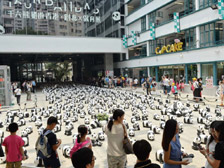
Visitor magnet:
The revitalised site not only draws together more than 100 local create-preneurs, but attracts throngs of sightseers, as well.
Visitor magnet:
The revitalised site not only draws together more than 100 local create-preneurs, but attracts throngs of sightseers, as well.
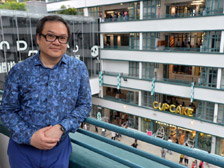
Collaboration call:
PMQ Executive Director Victor Tsang notes that PMQ has accommodations for international designers-in-residence.
Collaboration call:
PMQ Executive Director Victor Tsang notes that PMQ has accommodations for international designers-in-residence.
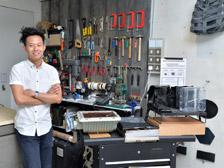
Low cost exposure:
Bag and accessories designer Jeffrey Leung is eager to have a platform to present his works.
Low cost exposure:
Bag and accessories designer Jeffrey Leung is eager to have a platform to present his works.
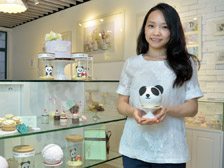
Edible art:
Phoenix Hui’s cake shop serves as a gallery for her creative cakes.
Edible art:
Phoenix Hui’s cake shop serves as a gallery for her creative cakes.
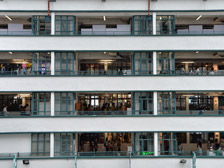
Diverse attractions:
PMQ has recorded more than 80,000 visitors since it opened in mid-April.
Diverse attractions:
PMQ has recorded more than 80,000 visitors since it opened in mid-April.
PMQ opens to panda-monium
July 13, 2014
There were 1,600 conservation conversation starters at the grand opening of PMQ in Central: pandas made of paper mache. Their purpose was two-fold, to arouse visitors’ concern about wild animal conservation, and to introduce the Police Married Quarters’ transformation into a creative industries landmark.
In 2009, the former Hollywood Road quarters was rated as a Grade 3 Historic Building and included in the Development Bureau’s “Conserving Central” project. The Musketeers Education & Culture Charitable Foundation was awarded the operating rights, in collaboration with the Hong Kong Design Centre, Hong Kong Polytechnic University and the Vocational Training Council’s Hong Kong Design Institute.
The revitalised site provides a platform for the creative industry, described as a home for more than 100 local young create-preneurs.
PMQ Executive Director Victor Tsang outlined PMQ’s three objectives: to support local creators and designers, to preserve Central District’s historic building designs and heritage, and to provide a public open space and leisure ground.
PMQ has nearly 130 tenants. A quarter of the space is reserved for well-known local designers and brands including G.O.D and Chocolate Rain, who pay rent at market rates. The rest is for creative enterprise start-ups which may be granted rent allowances of 20% to 50%.
Local-global exchange centre
All tenants must meet stringent requirements, Mr Tsang said, which include demonstrating previous design works and preparing viable commercial proposals. Tenants’ potential for creative interaction with other tenants was also a factor.
Mr Tsang feels that since Hong Kong is a city with both Eastern and Western cultural influences, local designers have the potential to go global. To that end, PMQ offers accommodation for international designers-in-residence, to allow them to have creative exchanges with their local counterparts.
“We appreciate PMQ is quite unique at this stage in Hong Kong, and being an open creative hub, that encourages a lot of retail activities. But its economic performance cannot determine whether PMQ is a success or not. In the long run, we want to see Hong Kong have a proliferation of projects similar to PMQ,” Mr Tsang said.
Tenants value platform
Many tenants had set up shops since PMQ’s soft launch in April, including bag and accessories designer Jeffrey Leung. He admits he was anxious in the initial stages of starting the enterprise. As PMQ grows in popularity, so, too, does his confidence that it will bloom into a vibrant art and design community.
“The most important benefit for us is to have a platform to present our works,” he said, bemoaning Hong Kong’s lack of such facilities. The rent reduction is a big boost for up-and-coming designers like himself, he noted.
Food focus
At PMQ, the design concept extends beyond novel products and fashion accessories, to food. Phoenix Hui operates a cake shop, which had its origins online. Her website did not elicit much customer feedback, though.
Now, she can exhibit her innovative cakes and interact with potential customers, to learn face-to-face which ones are most appealing, or how she could modify them.
“We are not just a shop selling cakes, we have a cake gallery, and hope to sustain and grow the business,” Ms Hui said.
While the number of visitors to PMQ is not the its management's main concern at this stage, it has recorded more than 80,000 visitors since it opened in mid-April. Many of them participated in tenants’ varied workshops, and expressed delight and surprise at the unique PMQ experience.
The 1,600 darling black and white ambassadors for conservation will greet visitors in the PMQ courtyard until July 17, before they set off on the next stage of their panda world tour.